Reaction to Supreme Court Northern Ireland Brexit ruling
- Published
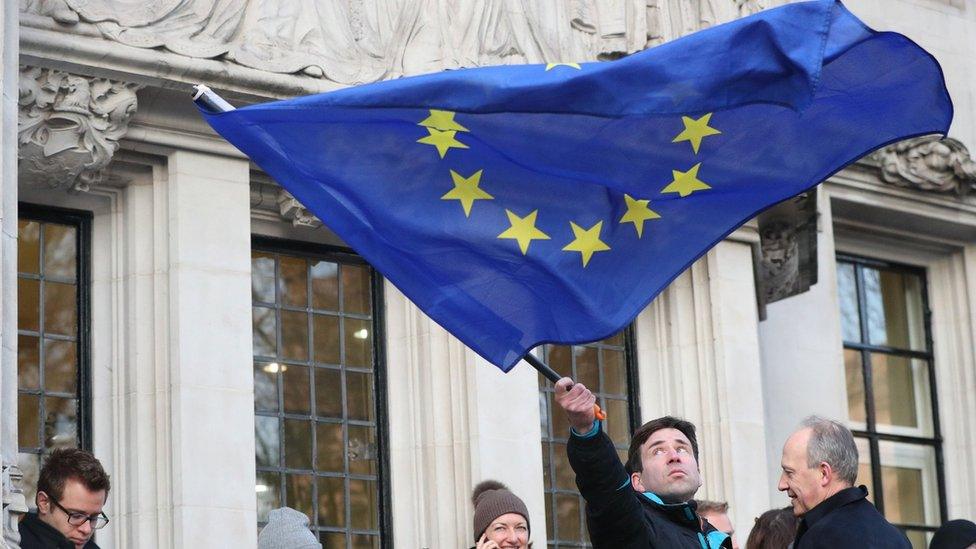
The Supreme Court ruling had been eagerly anticipated
The headline ruling from the UK's highest court on Brexit is that Parliament must hold a vote before formal negotiations can begin.
While the government lost that fight, it won another.
The Supreme Court judges ruled the government was not legally obliged to consult the Scottish Parliament and Welsh and Northern Ireland assemblies on triggering Article 50 - getting formal exit negotiations with the EU under way.
There were two legal challenges from Northern Ireland to the UK leaving the EU - the first, brought by a cross-party group of Stormont politicians, argued that the consent of the assembly was needed as well as legislation in Westminster.
The second, brought by victims' campaigner Raymond McCord, argued Brexit was a constitutional change and the 1998 Good Friday Agreement meant Westminster had given sovereignty of Northern Ireland over to its people.
However, the judges said the peace deal covered Northern Ireland's place in the UK, not its place in the EU.

Mr McCord's son was murdered by loyalist paramilitaries and he now campaigns for victims of violence during Northern Ireland's Troubles
Speaking after the judgement, Mr McCord said the headline ruling was a "great result" for democracy and he hoped Northern Ireland's mostly DUP MPs would vote to remain in the EU.
"Are they going to go along with the wishes of the people of Northern Ireland, who voted to remain? Are they going to put the party before the people?"
Although the UK voted overall to leave the EU, a 56% majority in Northern Ireland voted to remain.
'Citizens in the north'
East Antrim MP Sammy Wilson, from the Democratic Unionist Party which campaigned for Brexit, said it would have been "totally irrational" to have the devolved administrations "dictate the direction in which the nation should go after such a clear and decisive vote".
"The battle now commences at Westminster and as far as the DUP is concerned, we will be using our votes and voice to ensure a rapid commencement on the negotiations to leave the EU," he added.

Supreme Court on NI

By BBC home affairs correspondent Dominic Casciani
During the four-day hearing in December, the justices heard arguments that Northern Ireland had a unique place in the UK constitution because of the nature of the 1998 Belfast Agreement and the devolved bodies that flowed from it.
Counsel argued that Northern Ireland's constitution cannot be changed without a vote by its people. In its judgement, the Supreme Court unanimously ruled that not only did the devolved bodies have no role in deciding the future of the UK as a whole in the EU, Northern Ireland had no special status beyond this either.
They ruled that while Northern Ireland's people did indeed have a fundamental constitutional say on being part of the UK, that did not extend to being part of the EU.
The court said: "In our view this important provision which rose out of the Belfast Agreement gave the people of Northern Ireland the right to determine whether to remain part of the UK or to become part of a united Ireland. It neither regulated any other change in the constitutional status of Northern Ireland nor required the consent of a majority of the people of Northern Ireland to the withdrawal of the UK from the EU."

Sinn Féin leader Gerry Adams said the judgments underlined the "importance of the Irish government's role in defending the rights of Irish citizens in the north".
"Brexit will undermine the institutional, constitutional and legal integrity of the Good Friday Agreement," he said.
The UK government's position is that it fully backs the implementation of the Belfast Agreement and its successors.
"The UK government is absolutely clear: None of the institutions and provisions set out in the Belfast Agreement are in any way undermined by the decision of the UK to leave the EU," said a spokesman. "There will be no return to the borders of the past."
But Sinn Féin's new leader north of the border, Michelle O'Neill, said the judgment that the Assembly did not need to be consulted before the UK government triggered article 50 ignores the wishes of the majority of people in Northern Ireland.
Mrs O'Neill said her party would continue to support special status within the EU for Northern Ireland.
It was now up to the Irish government to work to protect the interests of all the people on the island, north and south, she added.
Irish Foreign Minister Charlie Flanagan welcomed the UK government's confirmation that it would proceed with the triggering of Article 50 by the end of March at the latest.
"The government's preparations for the upcoming negotiations on the UK's withdrawal from the EU have been extensive and comprehensive," he said.
"Our priorities in these negotiations remain our citizens, our economy, Northern Ireland, our Common Travel Area and the future of the EU itself."
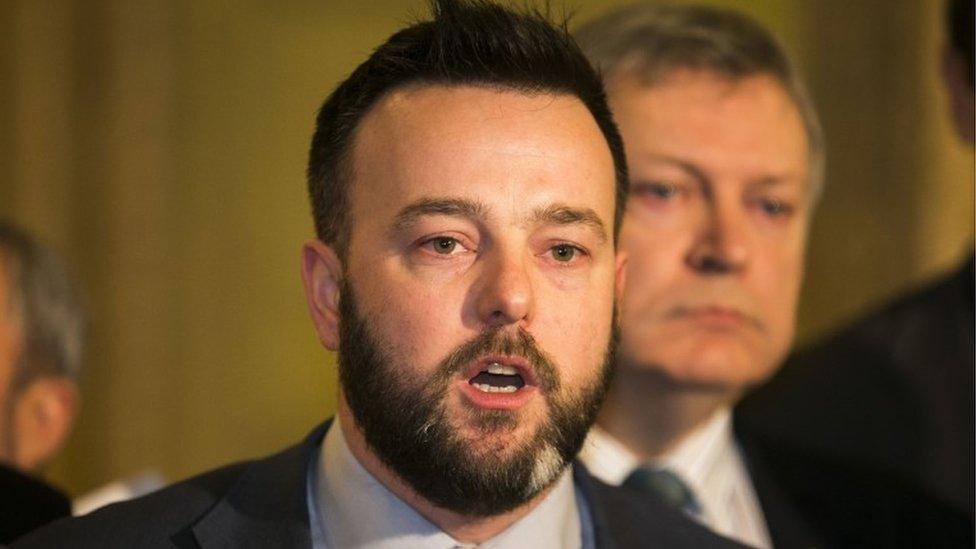
The SDLP's Colum Eastwood said it was 'good' that Westminster would have a vote
Social Democratic and Labour Party (SDLP) leader Colum Eastwood, who was one of the politicians involved in the Stormont legal challenge, told the BBC he was "very disappointed" by the judges' decision on the devolved nations.
"I think that runs a coach and horses through our devolutionary settlement and it makes us all ask what this is all about?" he said.
"It's very dangerous for the Good Friday agreement and our peace process."
Stephen Agnew, from the Green Party, who was also part of the politicians' challenge, said he was "pleased" the Supreme Court had decided that Parliament would have its say on the triggering of Article 50.
"This decision upholds democratic principles and provides an opportunity for consideration of the specific circumstances of Northern Ireland," he said.
Ulster Unionist MP Danny Kinahan urged Brexit Secretary David Davis to include his party in discussions regarding the negotiations.
"Unlike their counterparts in Scotland and Wales, the Northern Ireland Executive has not submitted a position paper to the Joint Ministerial Committee, leaving Northern Ireland's unique needs unrepresented," he said.
"The Brexit secretary appeared receptive to the idea of including other parties in correspondence."
- Published24 January 2017
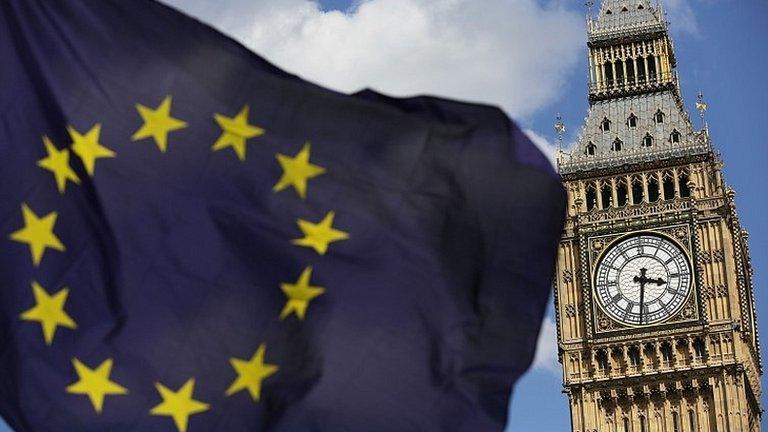
- Published24 January 2017
- Published24 January 2017
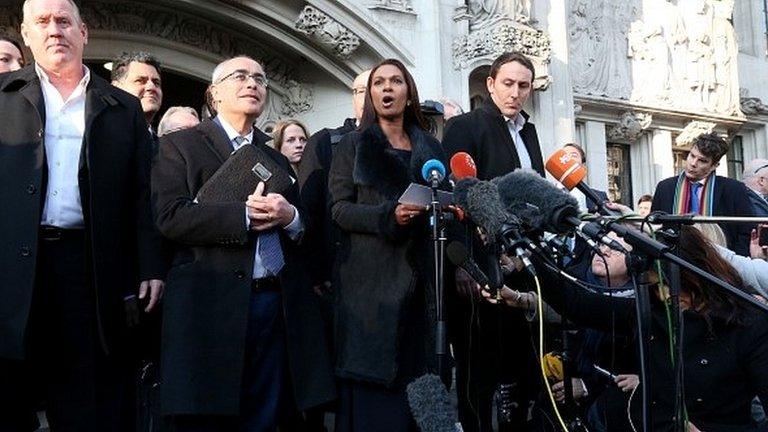
- Published25 January 2017
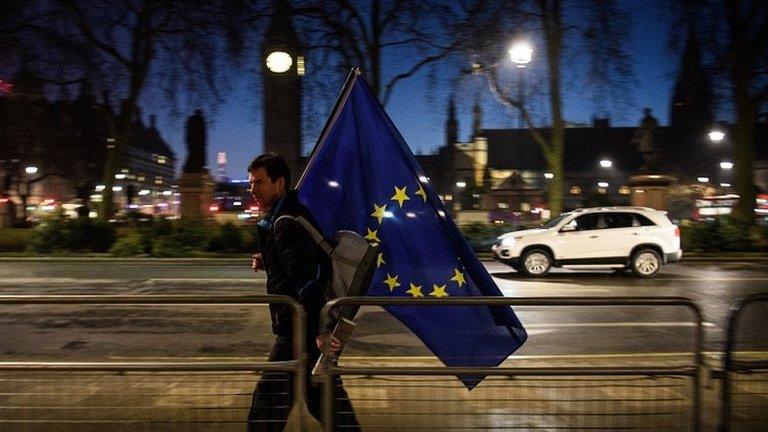
- Published30 December 2020
